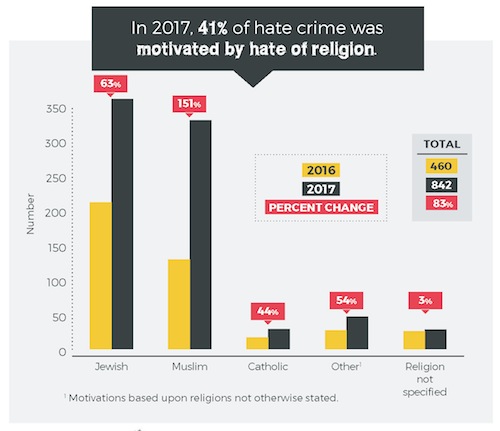(image from Statistics Canada)
Crimes against identifiable groups in Canada have spiked sharply, according to the latest data from Statistics Canada on police-reported hate crimes. Jews and Jewish institutions were the foremost targeted group, but hate crimes against Muslims comprised the largest increase.
Across Canada, there were 2,073 police-reported hate crimes in 2017, an increase of 664 incidents over the previous year. Almost half of all hate crimes were reported in Ontario. In British Columbia, 255 hate crimes were reported to police, including 68 that targeted Jews, 36 incidents against black people, 19 against Muslims and 18 crimes based on sexual orientation. Reported hate crimes against the Muslim, black, Arab or West Asian and LGBTQ+ communities all increased nationwide.
Across the country, hate crimes against the Jewish community rose by 63% between 2016 and 2017 – from 221 incidents to 360 – and the Jewish community remained the most frequently targeted group in both absolute and per capita terms, the report stated. Hate crimes against the Muslim community increased 151% between those years, from 139 police-reported incidents in 2016 to 349 in 2017.
In one of few comparatively bright spots in the report, violent incidents decreased as a proportion of all hate crimes, accounting for 38% of reported hate crimes in 2017, down from 44% in 2016. But this proportional decline is tempered by the raw numbers. The actual number of violent hate crimes increased 25% but decreased as a proportion of hate crimes overall only because the number of non-violent crimes increased that much more – non-violent offences like mischief and public incitement of hatred increased 64%.
Of the 360 police-reported crimes against Jews or Jewish institutions across Canada in 2017, 209 of those were in Ontario and 49 in Quebec – making British Columbia not only the second province in raw numbers of anti-Jewish attacks, but almost tying Ontario on a per capita basis and surpassing all other provinces by far.
Hate crimes in Canada have been creeping upward relatively slowly since 2014, according to Statistics Canada, but 2017 saw a leap of 47% over the previous year. Most of the crimes involved hate-related property crimes, such as graffiti and vandalism.
Despite the large increase in 2017, however, hate crimes still represent a very small proportion of overall crime – about 0.1% of the more than 1.9 million non-traffic crimes reported by police services in 2017. That said, a 2014 Statistics Canada study, General Social Survey on Canadians’ Safety (Victimization), in which Canadians self-reported incidents of perceived hate crimes, indicated that two-thirds of such incidents were not reported to police, suggesting that the numbers in the hate crimes reports might underestimate actual incidents substantially.

“Police-reported hate crimes refer to criminal incidents that, upon investigation by police, are found to have been motivated by hatred toward an identifiable group,” explains StatsCan. “An incident may be against a person or property and may target race, colour, national or ethnic origin, religion, sexual orientation, gender identity or expression, language, sex, age, mental or physical disability, among other factors. In addition, there are four specific offences listed as hate propaganda offences or hate crimes in the Criminal Code of Canada: advocating genocide, public incitement of hatred, wilful promotion of hatred, and mischief motivated by hate in relation to property used by an identifiable group.”
Hate crimes against Muslims, particularly in Quebec, contributed significantly to the overall spike in 2017 reported incidents. Hate crimes in that province increased 50% over the previous year, with incidents targeting Muslims almost tripling to 117 reports in 2017 from 41 the previous year. Perhaps most disconcertingly, the biggest spike in anti-Muslim incidents in Quebec occurred in the month following the mass shooting at the Islamic Cultural Centre of Quebec, where six Muslim men were murdered in a shooting rampage on Jan. 29, 2017.
In response to the statistics, which were released Nov. 29, the Centre for Israel and Jewish Affairs called on the federal government to take a three-pronged approach to hate-motivated crime and related matters.
“In the wake of this report, we are reiterating our call on the Government of Canada to take three key steps to combat hate,” Shimon Koffler Fogel, chief executive officer of CIJA, said in a statement. “First, we are grateful that the prime minister announced he will enhance the Security Infrastructure Program. We urge the government to expand it to cover training costs, especially given that emergency training saved lives during the Pittsburgh synagogue attack. Second, we need a national strategy to combat online hate. Experience shows that vicious rhetoric online can fuel and foreshadow violence offline. Third, the federal government should strengthen the capacity of law enforcement to combat hate crime. This should include enhancing legal tools to deal with hate speech and supporting the creation of local hate crime units where they are lacking.”

